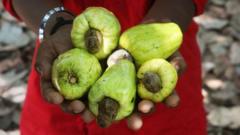Ghana’s rich agricultural landscape boasts cashew nuts as a major export crop, making the narrative around their production a crucial one for local farmers and the economy. Despite being the third-largest exporter globally, Ghana predominantly exports unprocessed cashews while struggling to enhance local processing initiatives.
As I wander Accra’s bustling streets, I’m struck by the price disparity of cashew nuts. A mere 30g bag of roasted cashews costs approximately 75 cents, a stark contrast to the minuscule price paid to local farmers—less than 1% of the retail value, leading one to ponder why such a significant markup exists.
Local farmer Nashiru Seydou, representing over 300,000 cashew producers, highlights the existential challenges they face, as they rely on sunlight and fertile soil for sustenance yet contend with unpredictable supply chains and fluctuating prices. Currently, Seydou earns around $50 for a 100kg sack of unshelled cashews, paltry compared to the $500 per tonne that roasters pay before selling finished products for up to $40,000 per tonne.
Mildred Akotia, an entrepreneur and CEO of Akwaaba Fine Foods, is among those keen on boosting local processing. Though Akotia's business currently processes 25 tonnes annually, high-interest rates (up to 30%) stymie investment in critical roasting machinery, leading to less than 20% of Ghana's cashews being processed domestically before export.
The situation is exacerbated by the reality that processed cashews are imported back into Ghana, often at prices that undermine local producers. Earlier government efforts aimed at stimulating domestic processing through an export ban on raw cashews faced backlash from farmers and were quickly retracted. Now, discussions around imposing tariffs and regulating direct purchasing from farms linger, but experts like Bright Simons urge a focus on enhancing local business efficiencies and consumer demand.
Prof. Daron Acemoglu emphasizes the need for boosting access to international markets alongside strengthening local capability. Ongoing challenges such as infrastructural inadequacies, skilled labor shortages, and corruption hinder progress.
Both Simons and Akotia lament the talent drain as innovative entrepreneurs leave for more lucrative opportunities abroad. Yet, Akotia remains hopeful. With ambitious plans for logistics improvements and a burgeoning demand from international markets, she aims to elevate Ghanaian processed foods. “I have a lot of calls from the UAE, Canada, and America,” she notes, aiming to meet local and international demand while uplifting the Ghanaian cashew industry.
As Ghana looks to fulfill its potential within the global cashew market, emphasizing local processing and seeking greater access to international avenues appear vital for the nation's economic aspirations.



















